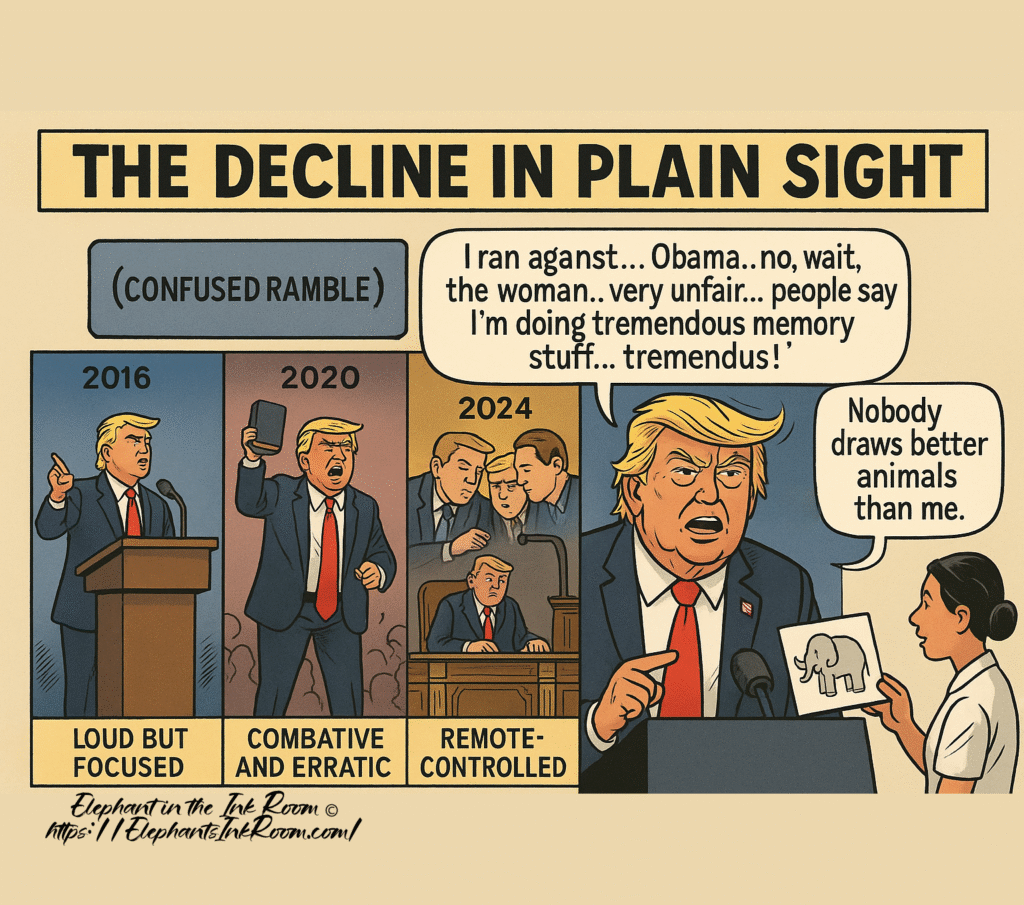Trumps Cognitive Decline or Dementia

/
RSS Feed
Good morning. Let’s walk through what’s known, what’s speculative, and what’s observable regarding Trump’s mental state — particularly the concern over possible cognitive decline or dementia.
What’s Observable:
Over time — and especially in recent years — Trump has shown a number of visible changes in behavior, speech, and memory that have led some observers (including former aides and medical professionals) to speculate about cognitive decline, possibly even dementia or frontotemporal degeneration. These include:
Verbal Confusion and Word Salad
-
Increasing slurring of words and tangential rants
-
Repeating phrases like “many people are saying” without follow-up
-
Nonsensical tangents mid-sentence (e.g., jumping from policy to personal grievances)
-
Confusing names and historical facts (mixing up Nancy Pelosi with Nikki Haley, or Obama with Biden)
Temporal Confusion and Memory Lapses
-
Claiming he beat Obama in an election (he ran against Hillary Clinton and Biden)
-
Repeated confusion of basic facts he used to confidently wield (dates, countries, officials)
-
Forgetting major policy positions he previously pushed
Behavioral Signs
-
More erratic, disinhibited public appearances (e.g., calling people “stupid,” “fat,” or worse)
-
Dramatic increase in grievance-oriented thinking and paranoia
-
Inability to process criticism without outbursts or projection
-
Long, rambling speeches where coherence breaks down over time
Medical Context (Without a Diagnosis)
Doctors who haven’t personally examined Trump cannot ethically diagnose him, but some neurologists and psychologists have raised red flags, including:
-
Possible frontotemporal dementia (FTD): A form of dementia marked by personality change, emotional flatness, and language disruption — more common in the 70s.
-
Cognitive fatigue: Long rallies or interviews often show him deteriorating in energy, focus, and coherence over time.
The group Duty to Warn (psychologists warning of presidential instability) has pointed to malignant narcissism, but that’s psychological, not neurological — though these can coexist.
How Trump and His Team Respond
-
Trump has bragged about passing a cognitive test, repeatedly mentioning he “aced” the Montreal Cognitive Assessment (which screens for basic dementia signs).
-
His public defenses often reinforce concerns, such as challenging Biden to “take a test,” as if this somehow proves his own sharpness.
-
Allies tend to dismiss critiques as political attacks, calling his behavior “strategic” or “authentic.”
Context: Comparison with Biden
Both men have had their cognitive fitness questioned — but Biden’s is often tied to slowness, stammering, or stiffness, while Trump’s is about impulse control, paranoia, and disorganized thinking. These are different types of decline, and one doesn’t negate the other.
What To Watch For
-
Worsening speech coherence over time
-
Delusions of grandeur or persecution
-
Increasing paranoia or fixation on enemies
-
Public lapses in understanding context or basic facts
-
Reliance on simple language, filler phrases, or repetitive content




Comments are Disabled